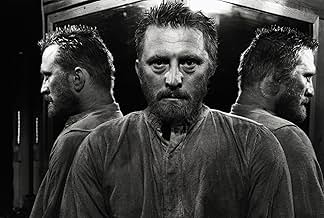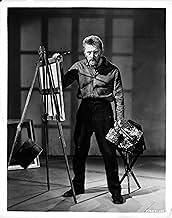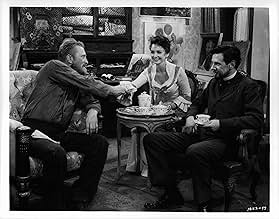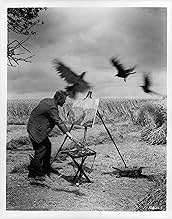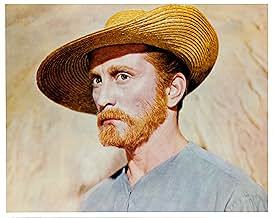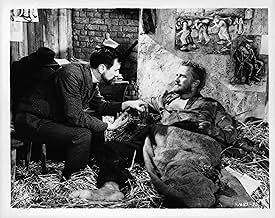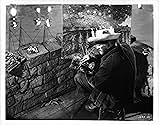- Vincitore di 1 Oscar
- 4 vittorie e 6 candidature totali
Recensioni in evidenza
Although I started my academic career as an art major, my interest was always in making art of my own rather than studying the works of the past masters. As a result, I wouldn't know a Manet from a Monet, but one painter whose work I can always identify is Vincent Van Gogh, perhaps the most famous example of the "tortured artist" who sought solace from the pain of life through his work. Like so many artists from different mediums, Van Gogh's life, especially the dramatic episode in which he sliced off his ear in an epileptic fit, is more famous than his work, a situation heightened, no doubt, by Don Mclean's melancholy ballad "Vincent," an improbable chart topper in 1972. Prior to being honored by the composer of "American Pie," Van Gogh's biggest brush with popular success came with Vincent Minnelli's film of Irving Stone's best-seller, an often melodramatic but still effective dramatization of the artist's troubled life. Kirk Douglas' intense portrayal of the impoverished and often fanatical Dutchman is helped immeasurably by his physical resemblance to his subject. Bearded, and with his blonde hair dyed red, Douglas could easily be mistaken for the man whose self-portraits hang on the wall of the modest bedroom where much of the film takes place. Occasionally, Douglas' clenched teeth and fist approach to drama comes through to reveal the actor behind the makeup, but his Oscar nominated performance seldom falls victim to the actor's "star" persona. Even Anthony Quinn, an actor who has given the same performance in dozens of movies, is good, but his brief turn as Paul Gaughan is hardly distinguished enough to merit the Oscar for best supporting actor. The rest of the cast is beautifully assembled with James Donald properly sympathetic as Vincent's patient, supportive brother, Theo, and no way can I complain about any film that finds room for the splendid presence of Henry Daniell, seen here as the patriarch of the Van Gogh family. The paintings, a wild riot of colorful intensity, are seen throughout (courtesy of numerous private collectors and public museums, including my hometown's Cleveland Museum of Art), and without them, "Lust for Life" would have a lot less luster.
This film is a rarity, a biopic which is more accurate than the book it's based on. Irving Stone's book was a major best-seller which did much to make Vincent Van Gogh one of the ten most famous artists in history but it did have its inaccuracies, particularly when it depicted its protagonist in Paris with other great painters of the time. In the book, Gauguin, Lautrec, Cezanne and Rousseau come off as typical bohemians while Vincent was made much more of a leader than he was. Minelli doesn't give us a detailed look at any of the artists except Gauguin but he is more accurate about who influenced Van Gogh and he does include his best friend, the now-forgotten Emile Bernard, if only as an extra in Tanguy's shop.
When Lust for Life came out, several critics dismissed it as too lurid and melodramatic, but those adjectives are accurate in describing Van Gogh's life. Note that Kirk Douglas does not play his usual cool, fun-loving tough guy and actually uses his whole body in his acting. For once Hollywood outdid itself.
When Lust for Life came out, several critics dismissed it as too lurid and melodramatic, but those adjectives are accurate in describing Van Gogh's life. Note that Kirk Douglas does not play his usual cool, fun-loving tough guy and actually uses his whole body in his acting. For once Hollywood outdid itself.
Lust For Life may look, at first glance, to be a typical Hollywood biopic, which is usually not much more than a star vehicle about a famous, real-life but vacuously recreated character, denuded of any real personality. Minelli certainly makes his biopic of Vincent Van Gogh with his trademark lavishness. But, importantly, he does not glamorise his subject. Instead, he makes a visually rich but earthy film, which exalts Van Gogh's achievement and seeks to portray the realities of his creative life and the dark side of his personality.
Lust For Life focuses on the extremely troubled man Van Gogh was, at turns listless, priggish, childish, needy, manic and quick-tempered; but also sensitive, caring, thoughtful, romantic and altruistic. Kirk Douglas is superb as Van Gogh, holistically exhibiting his various and contradictory aspects: obsessive though circumspect artist, diffident but passionate friend, forlorn romantic and dangerous maniac. It is all the more of an accomplishment as he is such a muscular, good-looking leading actor (nor should Anthony Quinn's key supporting performance as Gauguin, a macho with hidden sensibilities, be neglected).
However, at the same time, what the film never forgets is Van Gogh's considerable achievement. Minelli's iridescence complements Van Gogh's colourful, vivacious visual style, and many of his paintings are shown throughout the film.
Critics have pointed to the over-use of melodrama in the film. Yet Lust For Life is rare in that the film is consummated by its melodrama, along with Miklós Rózsa's grand, sweeping music. In other words, its melodrama succeeds, making the viewer identify more with Douglas' Van Gogh, giving him a greater, but also justified, pathos and sense of tragedy.
Lust For Life is the best Hollywood Biopic
Lust For Life focuses on the extremely troubled man Van Gogh was, at turns listless, priggish, childish, needy, manic and quick-tempered; but also sensitive, caring, thoughtful, romantic and altruistic. Kirk Douglas is superb as Van Gogh, holistically exhibiting his various and contradictory aspects: obsessive though circumspect artist, diffident but passionate friend, forlorn romantic and dangerous maniac. It is all the more of an accomplishment as he is such a muscular, good-looking leading actor (nor should Anthony Quinn's key supporting performance as Gauguin, a macho with hidden sensibilities, be neglected).
However, at the same time, what the film never forgets is Van Gogh's considerable achievement. Minelli's iridescence complements Van Gogh's colourful, vivacious visual style, and many of his paintings are shown throughout the film.
Critics have pointed to the over-use of melodrama in the film. Yet Lust For Life is rare in that the film is consummated by its melodrama, along with Miklós Rózsa's grand, sweeping music. In other words, its melodrama succeeds, making the viewer identify more with Douglas' Van Gogh, giving him a greater, but also justified, pathos and sense of tragedy.
Lust For Life is the best Hollywood Biopic
This is one of my favorite films. It deeply touched me. It's in my top 20 for sure. Maybe top 10. The acting, directing, and production are all about as good as it gets. It's a shame Kirk Douglas didn't win the best actor Oscar. I think it's his finest performance. I can't think of a single bad thing to say about this great movie. It's a vivid (and accurate) tribute to the immortal Vincent.
Not only does KIRK DOUGLAS bear a remarkable resemblance to the real Vincent Van Gogh, but he gives a deeply felt, bigger than life performance in the role of a lifetime, fully deserving his Academy Award nomination.
The letterbox version on TCM doesn't do justice to the film's brilliant color photography, deliberately muted for the early coal mining scenes but crisp and clear when it comes to Van Gogh's now famous paintings. I haven't seen the DVD version, but I hope it's considerably better than the print showing on cable.
At any rate, it's tremendously well done--the entire look of the production creating the sense of time and authentic atmosphere and actually filmed on the actual location sites with an impressive cast of villagers and supporting actors. PAMELA BROWN, NIALL MacGINNIS (as The Postman), and most of all, JAMES DONALD as brother Theo, who nurtures his brother and supports him financially but is unable to sell any of his paintings--except one.
It's a fine recreation of the Irving Stone novel and Douglas immerses himself in the character of Van Gogh, much the way ANTHONY QUINN does as Gauguin. Quinn's stormy, tempestuous relationship with Douglas provides some electric moments of conflict.
The score by Miklos Rozsa accents the drama at every turn, slashing at the drama the way Van Gogh slashed at his canvas with thick brush strokes. It's starkly dramatic without ever being overbearing.
Vincent Minnelli's direction is above reproach. A finer tribute to the tormented artist could not be imagined with so many of his canvases shown on screen in impressive close-ups.
The letterbox version on TCM doesn't do justice to the film's brilliant color photography, deliberately muted for the early coal mining scenes but crisp and clear when it comes to Van Gogh's now famous paintings. I haven't seen the DVD version, but I hope it's considerably better than the print showing on cable.
At any rate, it's tremendously well done--the entire look of the production creating the sense of time and authentic atmosphere and actually filmed on the actual location sites with an impressive cast of villagers and supporting actors. PAMELA BROWN, NIALL MacGINNIS (as The Postman), and most of all, JAMES DONALD as brother Theo, who nurtures his brother and supports him financially but is unable to sell any of his paintings--except one.
It's a fine recreation of the Irving Stone novel and Douglas immerses himself in the character of Van Gogh, much the way ANTHONY QUINN does as Gauguin. Quinn's stormy, tempestuous relationship with Douglas provides some electric moments of conflict.
The score by Miklos Rozsa accents the drama at every turn, slashing at the drama the way Van Gogh slashed at his canvas with thick brush strokes. It's starkly dramatic without ever being overbearing.
Vincent Minnelli's direction is above reproach. A finer tribute to the tormented artist could not be imagined with so many of his canvases shown on screen in impressive close-ups.
Lo sapevi?
- QuizMany of the locations used for filming were the actual locations Vincent van Gogh visited in his life.
- BlooperAt Arles, when Paul Gauguin is explaining his philosophy, Vincent mistakes him for Theo saying "but Theo, err Paul..." However, this is in the script. The whole point of the line is that Van Gogh views his conversation with Gauguin as nothing more than an extension of talks he's had with Theo since childhood.
- Citazioni
Paul Gauguin: I'm talking about women, man. Women. I like 'em fat and vicious and not too smart. Nothing spiritual either. To have to say 'I love you' would break my teeth. I don't want to be loved.
Vincent Van Gogh: You really mean that, Paul.
- ConnessioniFeatured in Van Gogh: buio nella luce (1956)
- Colonne sonoreLa Marseillaise
(1792) (uncredited)
Written by Claude Joseph Rouget de Lisle
Played by a band in France, near the end
I più visti
Accedi per valutare e creare un elenco di titoli salvati per ottenere consigli personalizzati
Dettagli
Botteghino
- Budget
- 3.227.000 USD (previsto)
- Tempo di esecuzione
- 2h 2min(122 min)
- Proporzioni
- 2.55 : 1
Contribuisci a questa pagina
Suggerisci una modifica o aggiungi i contenuti mancanti

![Guarda Trailer [OV]](https://m.media-amazon.com/images/M/MV5BNjMwYjdhMDItMDA1NC00YjJlLWFhZjctYWY5YjBlNDdiODFiXkEyXkFqcGdeQXRyYW5zY29kZS13b3JrZmxvdw@@._V1_QL75_UX500_CR0)
